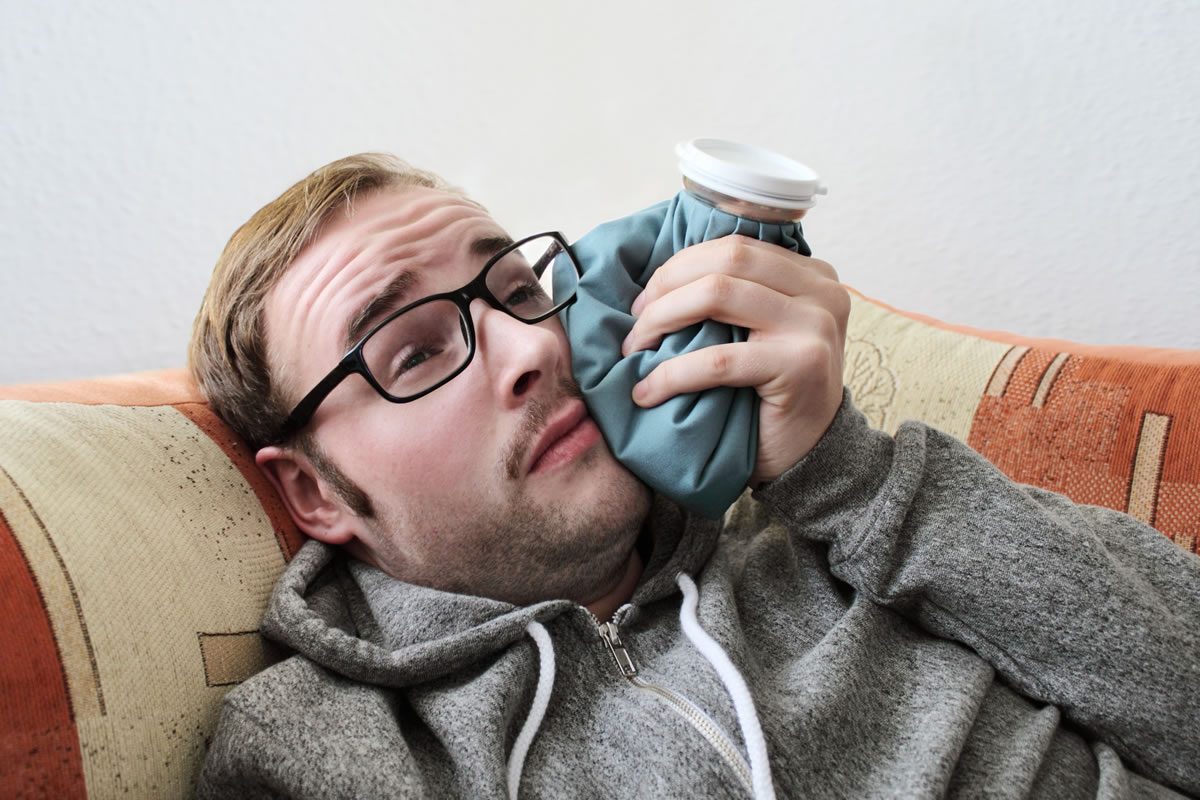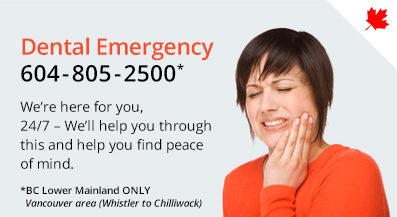
What constitutes an emergency – and what to do about it
Dealing with a dental emergency during the Covid-19 crisis
On this page we’ve compiled information from other pages and articles on our site to help you and your family deal with any dental concerns or emergencies that may arise during the Covid-19 crisis.
- What constitutes an emergency
- What do I do if I have a broken or knocked out tooth
- Symptoms of a cracked tooth
- What do do when you have swelling of the face or gums
- What to do if you have received facial trauma from a recent accident
Also see:
- Tips for dealing with dental pain and discomfort
- Steps to take when planning to visit the dentist during the Covid-19 crisis

NOTE: If you’re experiencing a dental emergency in BC’s lower mainland, you can call our 24/7 emergency line at: 604-805-2500
What constitutes an emergency
- A Broken or Knocked Out Tooth
- A cracked tooth that is causing extreme pain
- Swelling, bleeding, or infection in the face and gums
- Facial trauma
What do I do if I have a broken or knocked out tooth?
First thing is to be very careful that you only handle the tooth at the CROWN of the tooth. Try not to touch the roots. Gently place into a glass of milk or place under your tongue. It is very important to clean the tooth well so that all traces of mud or dirt are removed, but NEVER make the mistake of scraping the tooth to remove debris.
From there it is important to contact an emergency dental location and let them know what has happened and the steps you have taken since the accident.
Re-implantation of a tooth can be successful if a dental team do it soon after it has been knocked out.
Please keep in mind that the tooth has to be handled only by the chewing side and never by its root.
Try to place the tooth back in its socket very gently after rinsing it to remove all debris. The tooth should be placed back at its original level. You should keep it in place by biting down on gauze or a clean handkerchief. In case you find it difficult to replace the tooth in its socket then you should place it in a container filled with milk or saliva. You can also carry it under your tongue if possible until you can reach an emergency dentist.
For more info visit: A Broken or Knocked Out Tooth Calls for an Emergency Dentist
Find an emergency dentist open near you.
Symptoms of a Cracked Tooth
Not every hairline tooth fracture will have symptoms. However, experiencing any of the following could be a sign that you have a crack in your tooth:
- Pain that comes and goes.
- Pain when biting or chewing, especially when you release a bite.
- Sensitivity to sweetness, heat, or cold.
- Swollen gums around the tooth that hurts.
A cracked tooth hurts because the pressure you exert when you bite down causes the crack to open. When you stop biting, the pressure is released, and the crack quickly closes back up, which results in another sharp pain. Even though cracks are nearly microscopic in size, when they open, they reveal the sensitive pulp inside the tooth. If the pulp becomes infected or damaged, a root canal might be necessary to save the tooth.
It is important to note that not all cracked teeth require emergency dental intervention. If the pain is minimal, and there are no signs of infection then it is best to wait.
What to do when you have swelling of the face or gums
Lumps on your gums may indicate an oral infection, like a local abscess. Plaque, tooth decay, and food particles can all cause these infections, which are more likely to occur when your immune system is low. Trauma and canker sores are two more common causes of lumpy gums. Trauma can occur when you take a knock to the mouth, when you ingest very hot food or beverages, or when your mouth is getting used to new braces or dentures.
Dental cysts are bubble-like lumps that form on your gums. Most dental cysts form near the roots of buried or dead teeth. While they can become painful, especially if they get infected, many are asymptomatic. While small dental cysts often don’t need removal, large cysts can make your jaw weak and put pressure on your teeth. Dental surgery can remove the cyst and treat dead root tissue to prevent its return.
Pregnant women may also notice small lumps near their gum lines. Called pyogenic granuloma or granuloma gravidarum, these lumps are simply caused by pregnancy hormones and are no cause for concerns.
More serious problems, including oral cancers and tumours of the teeth or jaw, can also cause lumps on the gum. While these conditions are much rarer, remembering they occur is a good incentive to investigate any unusual lumps on your gum.
It is important to note that not all lumps or swelling require emergency intervention, but it is something you should speak to a dental professional about.
For more information visit: Changes in the Mouth
Find an emergency dentist open near you.
What to do if you have received facial trauma from a recent accident
If you have received trauma to your face due to a recent accident it is important to get the right treatment. Calling 811 is the matter isn’t an emergency, or 911 if it is should be your first step.
The the trauma is minimal but you have cracked or broken a tooth, you should follow the guidelines above regarding having a tooth fall out.
Tips for dealing with dental pain and discomfort
While emergency resources are being taxed and we are trying to practise social distancing there are many steps we can take to deal with minor dental pain and discomfort.
Please see our list of posts below for tips on dealing with minor dental issues:
- Good Home Remedies for a Toothache
- What to do when you have a Toothache or Tooth Trauma
- Top 3 reasons why teeth hurt
- Numb Tongue and Other Worrying Sensations Following Dental Procedures
Steps to take when planning to visit the dentist during the Covid -19 crisis
Your primary goal is stopping the spread of germs. When you sneeze or cough, you’re potentially spreading your germs. While using a handkerchief or covering your mouth is a nice thought, you should do more. Germs spread quickly in an office environment. Although our offices that are still open are following strict hygiene protocals, you should assume that everything you touch in the waiting area, the check-in station, and the dentist’s office is a potential source germs.
The first thing you should do when you enter the dentist’s office is wash your hands. If that’s not possible, bring a wet wipe and some hand sanitizer with you, and use them instead. After you’ve signed in and sat down, sanitize your hands again. That way, you also avoid picking up germs from others, which could potentially make you even sicker.
Most importantly, you should avoid direct contact with others. That includes patients and office workers. You should also tell your caregivers that you’re contagious. They will probably take precautionary steps, such as putting on latex gloves.
